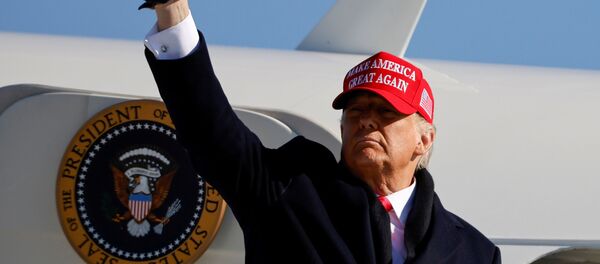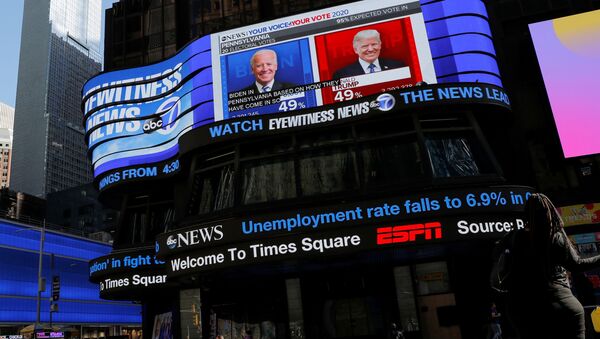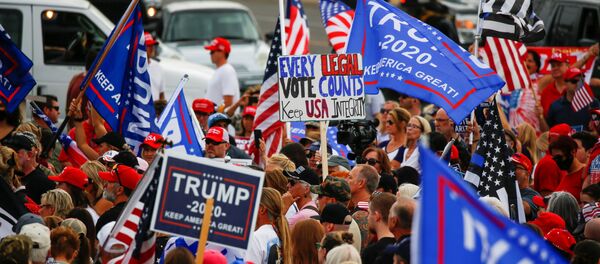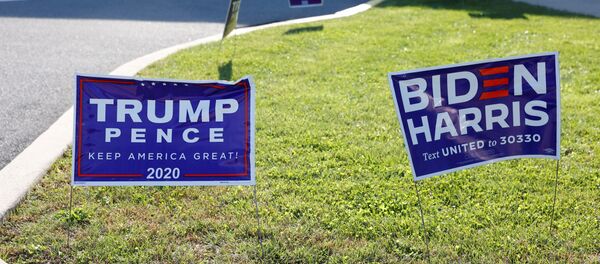Joe Biden delivered a speech on Friday evening in Wilmington, Delaware, saying that he is going to win the presidential race, albeit adding that "there is no final declaration of victory yet".
But as the vote count continues in key battleground states, his rival and 45th president of the United States, Donald Trump, showed no sign of being ready to concede in a contest that has dragged on for days. On the contrary, he has been working on a litigation strategy and vowed to challenge the outcome of the election in the US Supreme Court, as he said that "all legal ballots must be counted and all illegal ballots should not be counted”, while accusing Democrats of resisting that call.
Dr Samuel Hoff, George Washington Distinguished Professor Emeritus of History and Political Science, Delaware State University, has offered his views on the ongoing heated battle for the Oval Office.
Sputnik: If Biden wins the presidency, do you think it will be possible for him to fulfil his election promises? It's already clear that Republicans will secure the majority in the Senate. Which of Biden's plans seem doable to you?
Dr. Samuel Hoff: Yeah, so there's going to be, as there is in American politics, the loyal opposition to the president and his party. But what has occurred over the last decade in the United States is going from a sort of respect for opposition to almost a toxic-type partisan politics and we hope that that doesn't occur. And actually, it could be partially dependent on how things end up in the national legislative race. We know that the House Representatives in the United States is still clearly in Democratic control. But right now, we're still trying to figure out what the US Senate is going to end up looking like. It’s even now, which would give the Democrats an advantage with the vice president breaking ties, but still looks like it could end up being Republican and that would certainly put a crimp in the president's aspirations and goals to fulfil his agenda.

But I think that’ll stay and I think there may be some initiatives that may not be as bold as some people like on things like climate change and other issues, but I think that the president-elect will most likely proceed in a careful way at first. But, who knows, sometimes a careful approach based on a close election can change in an instant. And I say that because of the terrorist attacks of September 11, 2001, and if you recall, President George W. Bush started out pretty carefully after his close election victory, but certainly was aggressive in foreign policy following the terrorist attacks in a way that might not have been predicted by the close election and even the close party alignment in the legislature. So certain things could come up and change things. But I think we're looking at, you know, a pretty cautious and careful approach to things on both domestic and foreign policy.
Sputnik: There were several suggestions that violations had occurred during the election - with "dead souls" and alleged ballot-box stuffing in Michigan, and North Dakota with its own "dead soul" so that the state now faces a revote, Pennsylvania with its September post-voting scandal and the US Postal Service itself, which didn't manage to deliver 150,000 votes in time. Is this just the usual mistakes endemic to a presidential election that we've seen playing out, or is this entirely new territory?
Dr. Samuel Hoff: Well, personally I would question the veracity and the accuracy of those stories about any kind inaccuracy or corruption coming out of any state, but what I would say is that the problems that your listeners and viewers may be watching here in the US now, it has certainly occurred, and not only in the Russian Federation, but throughout other places in the world.
And there's a one-word answer that really is the reason for what we're seeing now, and that’s the pandemic. The pandemic was the reason that so many states allowed mail-in votes; mail-in is separate from absentee. An absentee vote is a mailed in vote, but it's based on a specific reason, mostly health reasons. A person can't get to the polls, so they apply to be an absentee voter. But those are few and far between, as opposed to the entire number of votes in the presidential election. But what occurred this time around was that a majority of states, at least 35 of the 50, allowed people to mail in their ballots and then some states had put regulations and laws in place that said, “OK, we'll allow that, but we're not going to start counting them until the polls close on Election Day”. And of course, the Election Day was Tuesday, 3 November.

uaNormally the last polls close at about 8:00 p.m. Eastern and Western time, depending on where we are. And so you have those issues as well. I mean, you know, then there are the questions of did someone vote twice in terms of mail-in and otherwise; you know, I don't see any evidence of that, but that's the kind of double-check that's occurring as these mail-in votes are being counted and that's further slowing things down.
The American Postal Service is a pretty reliable service. It's been around since before the United States itself became an independent country, and it has this sort of saying that it delivers in the rain, sleet, and snow.
In the context of a very heavily participated election, I mean, the good thing about that is that even though we're experiencing this delay, I’m sure a lot of folks are now patting themselves on the back. And the United States itself, I think, should be proud of the turnout, despite the fact that it occurred in this pandemic; everything is showing that it exceeded the turnout for the last century in presidential elections. And that's good. It means people are engaged. And also, it does present the question, 'Should we be voting easier in the way that we saw this election in order to increase the turnout?' That'll be a big question moving forward. And there's always the question of this wouldn’t happen if we simply had a popular vote rather than having both the popular and the Electoral College.
So there will be traditional calls to get rid of the Electoral College as there seemingly always are when we have a close election like in 2000 – 2004 was actually pretty close as well, and certainly like 2016.
Sputnik: With news arriving from Georgia, Pennsylvania, Nevada, and Arizona, how do you rate each candidate's chances?
Dr. Samuel Hoff: I've been paying attention to those results and what had to happen, regardless of how I feel, what had to happen is that in order for the president to reach 270 and be re-elected, he had to win Pennsylvania, Georgia, and North Carolina and then take either Arizona or Nevada. And what I understand is that we've seen the results turn against the president in Georgia, although narrowly. And we're in the midst of seeing the results turn in Pennsylvania. It went from a 100,000-vote lead by the president yesterday to about a 7,000-vote lead for Joe Biden now.
y many networks for Biden, and then they took it back and it seems to be closing even tighter than Nevada, which I thought would have been the one that the president might have been able to win. The bottom line is: can the president win Pennsylvania, Georgia, North Carolina, and either Arizona or Nevada? Unfortunately, I just don't see that the election of states is going in his favour, the way things are turning out at this point.
Sputnik: What are your thoughts about the split in society as these elections seem to suggest the country is evenly divided between the Republican and Democrat camps?
Dr. Samuel Hoff: I would agree with that and say that there's not necessarily anything bad about that. I mean, if you look at presidencies that begin after close elections in the United States, and, you know, you can see different patterns. For instance, in 1960, the entire election was decided by 100,000 votes. And then we know what happened in the years of the John Kennedy administration. In 1976, Jimmy Carter won over the incumbent, Gerald Ford, who had taken over from Richard Nixon. That was a pretty close race; Nixon himself had won a really close race in 1968. Of course, you know, certainly the most recent was Donald Trump in 2016 winning a close race. So, you know, you sort of take a look at the examples of contemporary American history where we've had a close election, and then take a look at the legislative setup party-wise. Anyway, it’s my job as a political scientist to be able to predict what could happen as a result of that. Like I said, I think being cautious, sort of moderate… I'd be surprised if the new administration would go so severely in one direction.
Sputnik: Could the gap between these camps widen despite who wins the presidency?
Dr. Samuel Hoff: It could widen if the division in the legislature between the House and Senate, assuming the Senate is retained by the Republicans… You know, if they act like adults and realise that they serve not themselves or any other institution, they serve the American people – as long as they keep that in mind, I think the comity between the parties will be there and hopefully that will lead to cooperation.
But if not or just in the manner by which President Trump approached relations with the legislature, in which I think he fanned the flames of party division between the Republicans and Democrats. Depending on the president elect, how he approaches the legislature, that really depends on that approach. To answer that question, I think it could always go worse. But, you know, you would probably have an easy time talking to a lot of people saying it can't get any worse than it is now. So in that sense, the extreme partisanship I think has been around at times in American history in the same manner it is now.
Hopefully the amount of partisanship will be reduced from what it was and we won't have that kind of division.
Sputnik: Historians often speak about the 1876 Tilden-Hayes compromise, where the election was decided only two days before the inauguration. How do you rate the present situation? Can it stay unsolved that long?
Dr. Samuel Hoff: Well, that's an interesting analogy. But you do have to have some familiarity with that 1876 race. What happened was that there were disputed electoral votes in four states, and so a 15-person commission was created to try to go through that controversy and solve the division and it took them that long to do it.
By the way, the commission was made up of eight Republicans and seven Democrats. Rutherford Hayes was a Republican and that’s why he got elected. That election was controversial from the get-go. In my view, which is why I'm glad you brought it up, it remains the most controversial election in American history.
But anyway, what prevents that now, I think, is a number of things. You remember that the United States uses the Electoral College system and by law, the electors in all the states are supposed to go to the Capitol six weeks after the election to officially designate who they had voted for in the election. Now that’s mid-December. If you recall from the 2000 election, that's when the US Supreme Court cut off the voting and said “this thing’s over”. So I don't think it'll go to two days before Inauguration Day in 2021.
But like I said, you know, I don't think they have anything to be ashamed of if he ends up where he started right after the 2016 election – he won a close one there, he lost a close one here, apparently. I don’t think they have anything to be ashamed of.





